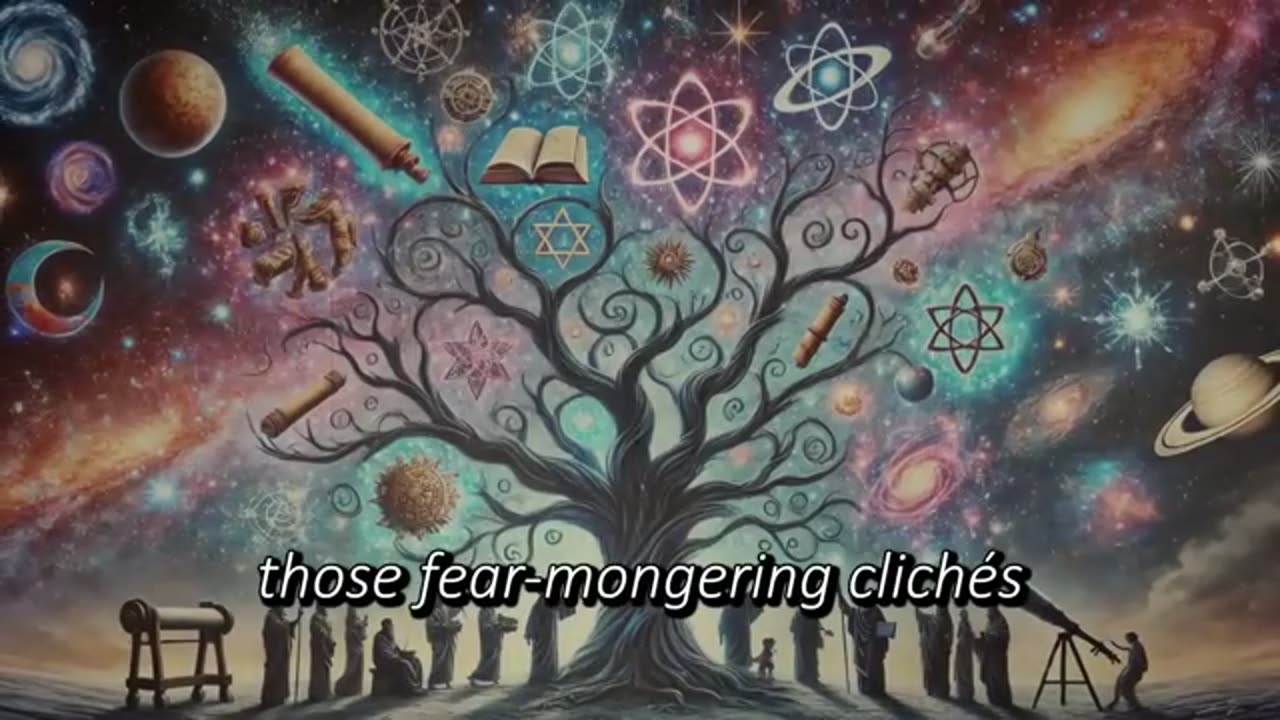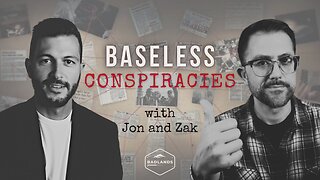Premium Only Content

How to PROVE God Does Not Exist
Source:
https://www.youtube.com/watch?v=BpJU-2xTY7I
This video challenges the existence of God and critically examines various arguments for religious belief, suggesting that religion is a human construct rather than a divine truth.
The video covers the following main points:
The Origins of Religion and Power
Early organized religions, such as those of the Sumerians, Egyptians, and ancient Mesopotamians, were polytheistic and served to explain the unexplainable while justifying the authority of kings and priests.
Institutional religion has historically focused on enforcing social order, using "Divine Law" like the Ten Commandments as early forms of legislation to make rules unchallengeable.
Christianity spread through political manipulation and force, notably when the Roman Empire adopted it as a tool for unification, granting the Emperor divine authority.
The Bible was compiled centuries after Jesus's death, with different sects having vastly different texts, and the version known today was "politically curated". Key doctrines, like the Trinity, were established through theological debates at councils like Nicaea.
This pattern of consolidation, suppression of alternative views, and political alignment is common across major religions like Islam, Hinduism, and Buddhism.
The Inconsistency of God and Holy Texts
The video argues that "holy books" like the Bible, Quran, and Vedas show God as cryptic, inconsistent, or absent, reflecting human fears and ambitions rather than divine truth.
The Bible is a compilation by dozens of authors over centuries, and its God often appears distant or complicit in suffering, as seen in the stories of Adam and Eve, Job, and Noah's Ark.
The Quran, though claiming to be unaltered, was compiled orally and shows variations in early manuscripts. The Vedas are fragmented and contradictory, lacking a unified vision of a single divine being.
Buddhism, notably, avoids the concept of God entirely as it's irrelevant to its teachings. All sacred texts have undergone human revisions, translations, and interpretations, challenging their divine origin.
The Ineffectiveness of Prayer and the Problem of Evil
Prayer is presented as an ineffective means of divine communication, citing historical events like the Black Plague and the Holocaust where prayers for intervention went unanswered.
A Harvard Medical School study from 2006 on intercessory prayer found no difference in recovery rates for patients who were prayed for.
The "problem of evil" challenges the idea of an omnibenevolent, omnipotent, and omniscient God, as suffering (both human-induced and natural disasters) persists despite such a God's supposed attributes.
Religious explanations for suffering, such as free will or a "greater plan," are dismissed as insufficient or "negligence".
Historical actions by religious institutions, like the Crusades and the Inquisition, demonstrate humans using "God as an excuse for their own cruelty".
The Evolution from Polytheism to Monotheism
The shift to monotheism was driven by power and efficiency, as one God meant one authority, making it easier to control people.
Early civilizations were polytheistic, with multiple gods reflecting the chaos of life. Zoroastrianism introduced the idea of one supreme god battling evil.
Judaism's shift to true monotheism was a response to the need for a unifying identity during the Babylonian exile.
Christianity "rebranded" Judaism, introducing concepts like the Trinity to appeal to a broader audience. Islam positioned itself as the final revelation, influenced by existing monotheistic traditions and used for political consolidation.
Monotheism systematically replaced polytheism through the destruction of temples and outlawing of "pagan" practices.
God as a Human Construct
The concept of God originated from human pattern recognition, fear (of death, suffering, the unknown), and the need for a "safety net" to cope with uncertainty.
God functions as an "ultimate coping mechanism," providing explanations and an "illusion of control" through practices like prayer.
Religion also serves a social purpose, fostering community and shared identity, which are evolutionary advantages for group survival.
People's concept of God often mirrors their own personalities, suggesting God is a "projection" created "in our own image".
Religious narratives are human storytelling used to explain life's biggest questions, with variations across cultures indicating human invention rather than divine revelation.
Debunking Philosophical Arguments for God
Ontological Argument: This argument (God is the greatest conceivable being, existence makes something greater, therefore God exists) is dismissed as "wordplay" and "semantic games" that confuse definition with reality. Existence is not a property that can be defined into being.
Cosmological Argument: This argument (everything has a cause, the universe exists, so it must have an uncaused cause, God) is criticized for its "selective logic" by exempting God from the rule of causality. Modern physics and quantum mechanics challenge classical causality, and the argument relies on outdated, prescientific assumptions.
Moral Argument: The claim that objective morality requires God is rejected. Morality is older than monotheism, stemming from evolutionary advantages and common sense. Religious texts contain "horrifying" moral codes (e.g., condoning slavery, genocide), which reflect societal biases rather than objective truth. The Euthyphro dilemma highlights that if God dictates morality, it's arbitrary; if God commands what's already good, God is unnecessary for morality. Studies show secular societies can be more moral.
Religious Diversity and Mystical Experiences
The existence of thousands of contradictory religions challenges the idea of a single divine truth. The video argues that if God wanted humanity to know him, he wouldn't allow such confusion and conflicting messages.
Even within single religions, there are vast divisions and contradictions (e.g., 45,000 Christian denominations).
Mystical experiences are attributed to human neurology and brain chemistry rather than divine intervention. Neuroscience shows specific brain regions are active during spiritual states, and experiences like near-death experiences or those induced by psychedelics can be recreated in controlled settings. These are seen as "universal quirks of human biology," not proof of the supernatural.
A World Without God
Religion is in decline globally, especially in Europe and among the unaffiliated in the US. This shift is attributed to technology providing access to information and higher education fostering critical thinking.
Abandoning religion doesn't mean abandoning meaning, purpose, or morality; these can be found in art, music, philosophy, science, and human relationships.
Secular societies can build community without religious institutions.
Science offers a "more inspiring" universe than any creation myth, promoting wonder through curiosity. The video concludes that humanity has moved on from outdated ideas before and will continue to evolve beyond myths and misconceptions.
-
 LIVE
LIVE
LFA TV
2 hours agoLFA TV ALL DAY STREAM - TUESDAY 9/2/25
9,936 watching -
 LIVE
LIVE
JULIE GREEN MINISTRIES
1 hour agoLIVE WITH JULIE
20,513 watching -
 LIVE
LIVE
The Bubba Army
4 days agoChicago BloodBath! 54 Shot, 7 Dead- Bubba the Love Sponge® Show | 9/02/25
8,490 watching -
 LIVE
LIVE
BEK TV
3 days agoTrent Loos in the Morning - 9/2/2025
250 watching -
 10:47
10:47
Nikko Ortiz
18 hours ago15 Seconds Of Fame Gone WRONG...
114K14 -
 14:47
14:47
GritsGG
1 day agoRumble Tournament Dubular! Rebirth Island Custom Tournament!
76.2K5 -
 1:36:05
1:36:05
Side Scrollers Podcast
20 hours agoStreamer ATTACKS Men Then Cries Victim + Pronoun Rant Anniversary + More | Side Scrollers
85.2K13 -
 LIVE
LIVE
Lofi Girl
2 years agoSynthwave Radio 🌌 - beats to chill/game to
284 watching -
 42:55
42:55
Stephen Gardner
1 day ago🔥Trump’s SURPRISE Move STUNS Everyone - Democrats PANIC!
108K128 -
 1:37:19
1:37:19
Badlands Media
18 hours agoBaseless Conspiracies Ep. 148: The Delphi Murders – Secrets, Setups, and Cover-Ups
54.7K21